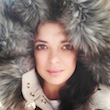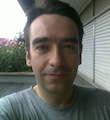|
Author
|
Topic: My Bolex D8L & I :-D
|
Eve Oval-Bruegger
Film Handler

Posts: 21
From: Zurich, Switzerland
Registered: Mar 2018
|
 posted April 13, 2018 03:59 PM
posted April 13, 2018 03:59 PM




Soon approaching is our first family holiday (next weekend!).. when you think that I only just recently discovered this new hobby of mine in March, it's no wonder l'm very nervous about shooting my first few films.
I'm going to take 2 colour & 1 B&W, & pray that something half decent comes back after processing! (I still haven't actually worked out where I'll be doing that yet.. I guess Germany or the U.K, as I live in Switzerland)
So this evening I've been getting acquainted (again), with my beautiful Bolex, which came in it's lovely original leather case. I've practiced inserting the film etc, as it came with an old one already inside, and feel quite comfortable with that so far.
I downloaded the 'original' Bolex instruction manual & went through that again too.. & I just have some questions, I'm hoping some kind soul will have the patience to answer :-)
Some questions:
1. What do I do with the viewfinder? If anything. Do I lift the front up & out of the way when filming, or does it just serve no purpose anymore.
2. Could you please explain in simple terms the use of the variable shutter?
3. The release selector seems to only take a shot at the centre position, and film when down towards the floor.. in the manual it says that it should film normally at that position & continually when at the lower, for as long as the motor is wound.. any ideas why?
4. Am I best filming at 18fps or 16?? Is it a bit bold of me to try some slo-mo footage, or should I wait until I'm a bit more experienced :-P
5. Do I NEED filters?? I don't have any yet..
6. How do I know how to adjust the lens? Between 2.8 & 22, will my film be out of focus if I forget to adjust it each time for example?
Could you please list say 5 important things I must remember before I begin a shoot, & anything I should take into consideration when shooting too.
Thank you!!
| IP: Logged
|
|
Dominique De Bast
Film God

Posts: 4486
From: Brussels, Belgium
Registered: Jun 2013
|
 posted April 13, 2018 06:28 PM
posted April 13, 2018 06:28 PM



Hello Eve. I'm happy for you.
Not knowing well your specific camera and English not being my mother tongue (we're talking about technical things, here), I'm not the best one on the forum to be able to provide you full help but I will try to give you some answers. I'm sure others will complete or correct what follows.
First, sorry if you think it's stupid, but just to be sure, the filmstock is sensitive to light, it's not like a video tape so you should load your camera in a place with not too much light and not open it (unless There is a problem) before the film is finished. Don't forget that a double 8 roll has to pass twice in the camera.
About your questions.
1. The viewfinder is made to look through (if I understood well your question) so you need to keep your eye on it. On reflex cameras, it is a must as some light could (in theory anyway) pass through it if your eye is not before (that's why on some models that have a timer (the camera is put on tripod and you can be in the scene) there is a system that occults the viewfinder.
2. I would advise you not to "play" with the variable shutter for your first films. The variable shutter selctor will allow to give more or less light (I believe There are three positions ; make sure it's not on the "closed position" otherwise your film will be black). This is used if There is too sun and the film in the camera is very sensitive or to make fades in/out or if for any reason you want to have more or less light.
3. Sorry, I have no answer.
4. The "classical" speed is 16 fps but when super 8 was intoduced, 18 fps became the norm so if you use an "old" standard 8 projector, it will be at 16 fps (but many "old" machines a a variable speed) while if you use a more recent double gauge projector, it will be at 18 fps.
5. Filters are usually used with black and white filmstock but honnestly I never used any and had never any problem (but I'm not a Professional, so other forum members may disagree).
6. The 2.2 to 22 range numbers are not focus setting but light settings. This is very important. If you shoot is a bright sun, you should use 22 (or 16) with a 50 asa filmstock). If There is few light, you should use 2.8 (but you need a minimum of light to use filmstock, it's not like with a smartphone or a video camera). The trouble is to know what number is to be used between 2.8 and 22. You can use a lightmeter or try to find some examples of scènes and the number that matches it. As a rule, I would say that if you hesitate, a darker film is always better that a too lighter one.
The distance has a number range that starts (depending on the cameras) around 1.5 and infinite. Keep in mind that the closer the subject is, the more acurate your setting has to be (if it's 1.5 meter and you selected 3, it will more than probably be out of focus. It it's 10 meters and you put 20, it should be ok. The more light there is (and the higher the 2.8 to 22 selector is pushed), the more tolerance you will have. For example, if you selected 1.5 m as a distance, and 2.8, you have to be precise as everything that is not close to 1,5 m will be out of focus, at the opposite, if you selected 22 fot the light (in bright sun), there will be more "deep field". Be aware that the zoom position is also crucial (the lower the number is, the less important the distance setting is).
Hope it is clear. If not, don't hesitate to ask more questions
![[Smile]](smile.gif)
--------------------
Dominique
| IP: Logged
|
|
|
|
David Roberts
Master Film Handler
Posts: 405
From: Suffolk. England
Registered: Apr 2004
|
 posted April 14, 2018 10:36 AM
posted April 14, 2018 10:36 AM



I had this model many years ago.it has a light meter built in,so in answer to your question 6,proceed as follows:-
there is a small lever on top of the rectangular box above the lenses,you push this down until it clicks,then through the viewfinder,turn the lens ring with those numbers on(f 22 etc.)until the two needles you can see in the viewfinder
are superimposed over each other. this sets the exposure.
there is another thing you need do first,and that is set the exposure meter for the film you are using. there is a round dial on the front of that rectangular box above the lenses,and you adjust this so that the red 16 is next to your film speed,which I think is in the ISO system.
if you have the camera insructions,this will be explained under"setting the exposure"
then you just focus using the rear ring on the lens,you can estimate this,and I think this will be set in feet.
Theres a lot to think about,but once use to it,this camera gives great results.
| IP: Logged
|
|
|
|
|



 UBBFriend: Email this page to someone!
UBBFriend: Email this page to someone!
 Printer-friendly view of this topic
Printer-friendly view of this topic



 UBBFriend: Email this page to someone!
UBBFriend: Email this page to someone!
 Printer-friendly view of this topic
Printer-friendly view of this topic